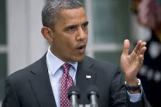In Defense of Less Defense
- thebrinkof
- Jun 7, 2014
- 3 min read
Cutting defense

President Barack Obama
The Obama administration wants to cut the defense budget, eliciting howls of protest from Republicans. Of course – while they continue to decry the deficit and the national debt. The deficit has shown substantial decline since 2012, including a 37 percent drop from April 2013 to this year. The Republican solution to continued improvement is slashing social programs that benefit the middle and lower classes. But don’t touch defense, which is sacrosanct.

U.S. Defense Secretary Chuck Hagel
Defense Secretary Chuck Hagel, a decorated Vietnam War veteran, wants to:
eliminate the aging fleet of A-10 Warthog aircraft, which were designed to knock out Soviet tanks in a western European invasion but now have little relevance
replace the U-2 spy plane with the remotely piloted Global Hawk
curtail spending on the F-35 fighter plane, which has been extremely expensive, run into costly delays, and has limited effectiveness
close unnecessary military bases and raise costs for housing and health care for military personnel and their families.
Trimming the trimming
These measures are opposed by the Republican-dominated House of Representatives, even though that same House imposed spending caps on defense. The House wants to do away with $50 billion of the proposed cuts, going against the wishes of the entire Joint Chiefs of Staff.
Failure to impose the cost reductions, the White House said in May, would increase “the risk to the (defense) department’s ability to implement the president’s defense strategy, contributing to a military that will be less capable of responding effectively to future challenges.”
The United States has 400,000 personnel in 100 countries. Republicans want to keep all of them there, and even the Obama administration favors retaining most of the military bases, with Hagel saying they’re necessary for a peaceful, free, and stable world.
Unwelcome intrusion

U.S. Sen. Bernie Sanders
A few liberals, such as Independent Bernie Sanders of Vermont, and most libertarians oppose our military presence all over the world. But other than these minority voices, none in government talks about the resentment and anger felt by many in whose countries the U.S. exerts control. The contrarians in the U.S. see that our interference abroad engenders hostility, particularly in Islamic countries, and foments violent opposition in the form of terrorism. We may not agree with the customs of those peoples, especially their archaic, brutal laws and gross mistreatment of women, but they must solve their own problems, the minority voices assert. We cannot, or should not, try to police the entire world.

U.S. Rep. Paul Ryan
The most influential Republican on budget policy, U.S. Rep. Paul Ryan, devised a budget calling not for a decrease, but an increase, in defense spending. His blueprint would erase budget deficits within 10 years, not through increased revenue from the extremely wealthy, but by deep cuts in domestic programs. He deplores welfare for the poor, while embracing corporate welfare.
In that and many other ways, he and former vice president Dick Cheney are peas in a pod. In February, Cheney lambasted the proposal for reductions in military spending, calling them “absolutely devastating,” and adding that Obama “would rather spend the money on food stamps than he would on a strong military or in support of our troops.” But then, Cheney has about as much credibility as, say, Richard Nixon.
Recession grows food stamps

former vice president Dick Cheney
The increase in food stamps was necessitated by the severe recession brought on by George W. Bush’s tax cuts, mostly for the rich, and his Medicare drug benefit, the two enacted while he launched wars in Iraq and Afghanistan – with no way to pay for them. Millions lost their jobs as a result, and the United States, except for its right-wing elements, cherishes the notion that it doesn’t allow people to starve. Those food-stamp costs, by the way, rose from around $45 billion in 2009 to $95 billion in 2013, and are expected to remain stable through 2019. Defense spending rose from some $325 billion in 2001 to $700,000 in 2010, going up slightly even under Obama, and now stand at about $650 billion. Economists say food stamps are a great way to boost the economy, because that money is spent.
And as we are seeing, the economy is on the upswing – despite the Republicans’ single-minded attempts to keep it depressed so Obama will not look good. With Fox News on their side, however, they have nothing to fear. The network has managed to convince its viewers, who constitute the majority of TV news watchers, that Obama is bad for them. They fail, or choose not to, realize that the Republican Party, more conservative than perhaps at any time in our history, does not side with them, but with the rich.




Comments